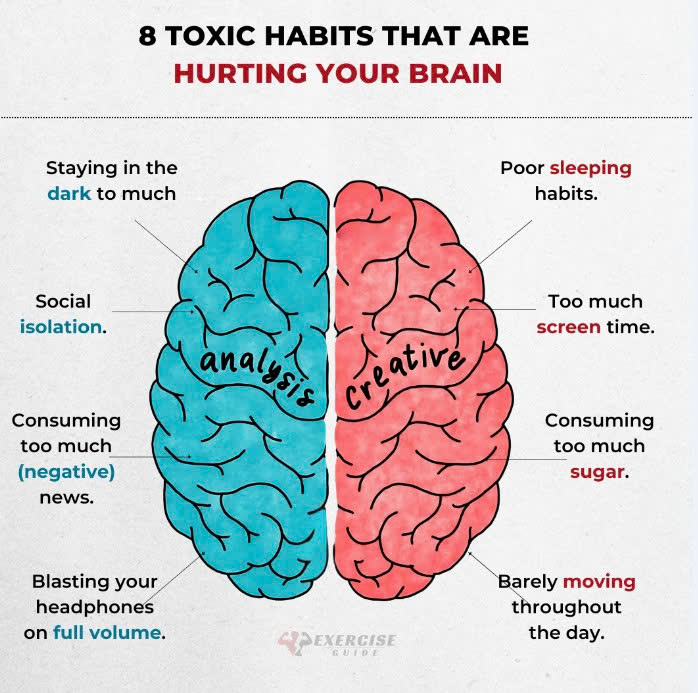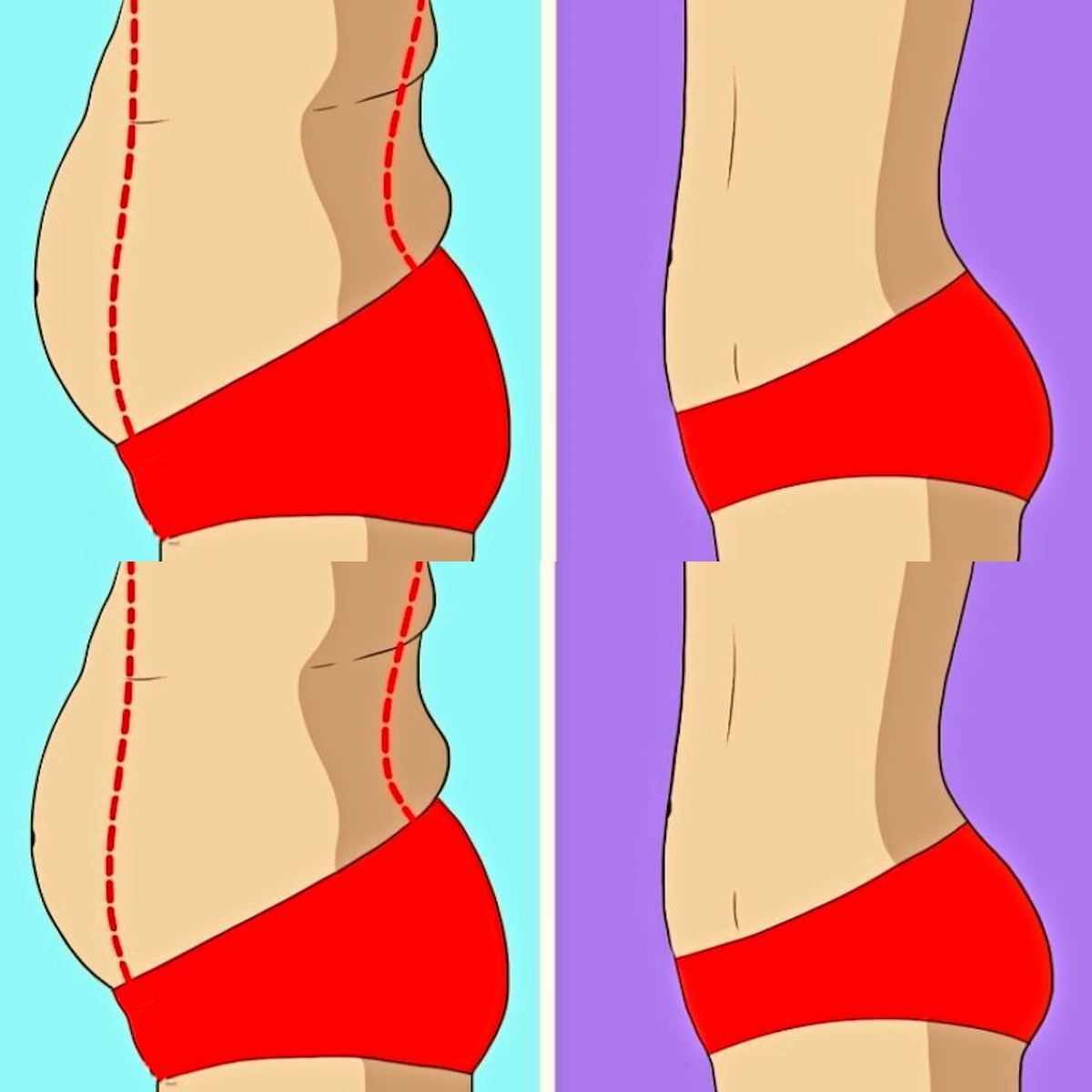
The brain, our central command unit, is constantly vulnerable to seemingly innocuous habits. This article will expose 8 detrimental practices silently eroding your cognitive functions and provide direct, actionable solutions. It’s time to confront these issues and actively protect this invaluable intellectual engine.
1. Drowning in Darkness: When Light Deficiency Robs Brain Vitality
- The Problem: Prolonged exposure to insufficient natural light not only disrupts circadian rhythms but also suppresses serotonin production – a key neurotransmitter regulating mood and cognitive function. Furthermore, a deficit in Vitamin D, often linked to sunlight exposure, correlates with cognitive decline and an increased risk of neurological disorders.
- The Solution: Embrace light as an ally. Prioritize workspaces near windows and maximize daily exposure to natural sunlight, especially in the mornings. Indoors, ensure adequate artificial lighting in living and working spaces, preventing the brain from lingering in a state of “perpetual twilight.”

2. Social Isolation: The Silent, Spreading Malady That Kills Intellect
- The Problem: The human brain is inherently wired for connection. Social isolation not only escalates the risk of depression and anxiety but also weakens neural networks, diminishes information processing capabilities, and can even lead to a reduction in gray matter volume. Lacking social interaction, the brain is deprived of essential stimuli vital for maintaining its plasticity.
- The Solution: Demolish invisible barriers. Proactively build and nurture high-quality social relationships. Engage with communities, join clubs, or simply dedicate time to direct conversations with friends and family. Social interaction is a potent tonic that stimulates brain development and preserves cognitive acuity.

3. Negative News Overload: A “Toxic” Diet for the Mind
- The Problem: Constant exposure to negative news, particularly via social media, activates the body’s stress response system (sympathetic nervous system). This leads to an increase in cortisol – the stress hormone – which can damage the hippocampus (a brain region crucial for memory) and impair concentration and analytical abilities.
- The Solution: Implement an information “diet.” Limit news consumption and prioritize reliable, balanced sources. Dedicate time to uplifting and positive content. Remember, you are what you consume.

4. Auditory Assault: When Loud Sounds Devastate the Brain
- The Problem: Blasting headphones at maximum volume not only causes permanent hearing damage but also indirectly impacts the brain. Hearing impairment forces the brain to work harder to decipher sounds, leading to cognitive overload and an increased risk of age-related memory decline.
- The Solution: Safeguard the brain’s “auditory gateway.” Maintain a safe listening volume (no more than 60% of device maximum) and limit continuous listening durations. Utilize noise-canceling headphones to reduce the need for increased volume in noisy environments.

5. Fragmented Sleep: The Silent Foe of a Clear Mind
- The Problem: Sleep is not merely a period of rest but a critical process of brain “restructuring” and “cleansing.” Chronic sleep deprivation hinders memory consolidation, the removal of accumulated toxins, and energy restoration, resulting in diminished cognitive function, slowed reaction times, and compromised problem-solving abilities.
- The Solution: Prioritize a “military-grade” sleep regimen. Establish a consistent sleep schedule, ensuring 7-9 hours of quality sleep nightly. Cultivate relaxing pre-sleep routines, avoiding blue light from electronic screens.

6. Screen Addiction: Blue Light and Brain Overload
- The Problem: Excessive screen time, especially with blue-light-emitting devices, not only causes eye strain but also suppresses melatonin production, disrupting sleep patterns. Continuous exposure to rapid, disjointed stimuli can further reduce deep focus, patience, and impede the development of creative thinking.
- The Solution: Plan a screen “detox.” Implement the 20-20-20 rule (every 20 minutes of screen time, look at something 20 feet away for 20 seconds). Allocate time for offline activities, reading physical books, and direct interpersonal communication.

7. “Sugared” Brain: The Sweet Curse on Cognitive Health
- The Problem: Excessive consumption of refined sugars causes drastic blood sugar fluctuations, impacting energy levels and mood. Furthermore, surplus sugar can lead to chronic inflammation and insulin resistance in the brain, escalating the risk of cognitive decline and conditions like Alzheimer’s.
- The Solution: Control the sugar “craving.” Minimize sugary drinks, candies, and processed foods. Prioritize complex carbohydrates, fiber, and protein to maintain stable blood sugar, nourishing the brain with sustainable energy sources.

8. Sedentary Lifestyle: The Brain “Dozes Off” When the Body is Static
- The Problem: Lack of physical activity not only affects physical health but is also a “death sentence” for the brain. Exercise boosts blood circulation, delivering vital oxygen and nutrients to the brain, and promotes the production of BDNF (Brain-Derived Neurotrophic Factor) – a crucial protein for neuronal growth and maintenance. Without movement, the brain becomes sluggish and less adaptable.
- The Solution: Integrate movement into your “breathing.” Engage in at least 30 minutes of moderate exercise daily. Seize every opportunity to move: take the stairs instead of the elevator, stand up and walk around while working. Physical activity is not just body training; it’s a “workout” for the brain.

The brain is our most invaluable asset, determining the quality of our lives and our potential for growth. Identifying and eliminating these 8 toxic habits is not merely self-preservation but a shrewd investment in your intellectual future. Begin today, with the smallest lifestyle adjustments, to “rescue” your brain from decline, unlock its full cognitive potential, and live a more fulfilling life. Brain health is in your hands.





